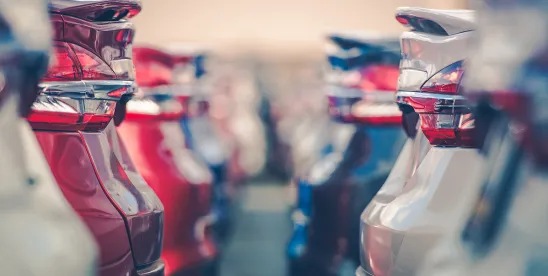Key Developments
- New UAW contracts that raise wages and benefits at automotive suppliers could have broader impact on the supply base, according to a report in Crain’s Detroit.
- Delays or revisions of certain EV investments are expected to help automakers conserve cash and provide time to lower EV-related production costs. However, these spending and production changes “will hurt major parts suppliers, which have to adjust their businesses,” according to analysts featured in The Wall Street Journal.
- U.S. new light-vehicle sales are projected to rise 7% year-over-year and reach a SAAR of 15.2 million units in August, according to a forecast from S&P Global Mobility. Battery-electric vehicle sales are expected to reach 8.1% of total new light-vehicle sales in August, and this is similar to the BEV share in July.
- J.D. Power expects BEVs to account for 9% of total U.S. new light-vehicle sales in 2024, down from a previous forecast of 12.4%, and up from 7.6% of total sales in 2023. The forecast also predicts BEVs will represent 36% of U.S. new-vehicle sales by 2030.
- Hybrid, plug-in hybrid and battery-electric vehicles collectively represented 19% of total new light-vehicle sales in the U.S. in the first half of 2024.
- The Office of the U.S. Trade Representative could issue a final determination “in the coming days” on Section 301 tariff increases for Chinese goods that include EVs and lithium-ion batteries. The Biden administration first announced the tariffs in May 2024.
- Both Republicans and Democrats are expected to continue to use tariffs to address trade and geopolitical issues, regardless of the outcome of the 2024 presidential election. Former President Donald Trump stated he could implement a 10% across-the-board duty on imported goods and a 60% tariff on goods from China. While Vice President Kamala Harris has not provided many details on her potential trade policies, she emphasized that a universal 10% tariff would raise consumers’ expenses.
- Canada plans to impose a 100% tariff on imports of EVs made in China, and tariffs of 25% on certain imported steel and aluminum products.
OEMs/Suppliers
- Ford will modify certain diversity, equity and inclusion initiatives, and end participation in surveys such as the Human Rights Campaign’s Corporate Equality Index, according to a report in The Detroit News.
- Volvo will invest approximately $700 million to establish a new North American heavy-duty truck factory in Monterrey, Mexico.
- Volkswagen is considering plant closures in Germany for the first time in the company’s history due to market challenges that include reduced vehicle sales, large investments required to produce EVs, and increased competition from Chinese automakers.
Electric Vehicles and Low Emissions Technology
- The number of plug-in hybrid models available for purchase in the U.S. has nearly doubled since 2019.
- The U.S. Department of Transportation on August 27 announced $521 million in grants to establish over 9,200 EV charging ports and build alternative-fueling infrastructure across 29 states, eight tribal areas, and the District of Columbia. The number of publicly available EV charging ports is estimated at 192,000, and this reflects growth of over 60% since the start of the Biden-Harris administration.
- GM will delay the start of production at a planned EV battery plant in Indiana by one year to 2027.
- Chinese EV maker BYD will postpone a decision to establish a factory in Mexico until after the U.S. election, according to unnamed sources in Bloomberg.
- Volkswagen will reassess a previous plan to establish six battery cell plants by 2030. In the near term, the automaker intends to focus on its upcoming battery plants in Salzgitter, Germany, Valencia, Spain and Ontario, Canada.
- GM postponed until year-end a $330 million second tranche of investment intended to support development of the Thacker Pass lithium mining project in Nevada.
Automated, Autonomous or Connected Vehicles Technologies
- The Wall Street Journal provided an update of key challenges that AI-driven vehicles will pose to engineers, programmers and other stakeholders.
- Uber and GM’s self-driving unit Cruise will launch a service in 2025 that will allow customers to book robotaxis on the ride-sharing platform. Cruise recently resumed service in Houston, Phoenix and Dallas with safety drivers present in vehicles.
- Chinese robotaxi operator WeRide Inc. delayed plans for a U.S. initial public offering, and stated more time is required to complete transaction documents.
Market Trends and Regulatory
- The National Highway Traffic Safety Administration closed an investigation into inappropriate hard braking and sudden stops by Cruise vehicles. Federal agencies that include NHTSA are still investigating reports that Cruise vehicles encroached on pedestrians in certain areas.
- The 5G Automotive Association urged the Federal Communications Commission to schedule a vote on rules to support cellular vehicle-to-everything (C-V2X) technology in the 5.9 gigahertz band.






 />i
/>i

